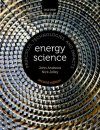![Energy Science Energy Science]()
Click to have a closer look
About this book
Contents
Related titles
About this book
Do renewable energy sources really provide a realistic alternative to fossil fuels? How does wind power compare to nuclear power, in terms of the energy it can generate? How do we get energy from the tides, and is it really a useful source of power?
Energy Science: Principles, Technologies, and Impacts integrates the science behind the key energy sources that are at our disposal today with the socioeconomic issues which surround their use to give a balanced, objective overview of the range of energy sources available to us today. Covering both traditional and renewable energy sources, the book encourages the reader to evaluate different energy sources on the basis of sound quantitative understanding. It also explores the fundamentals of energy generation, storage and transmission, to build a complete picture of energy supply, from wind turbine, nuclear reactor, or hydroelectric dam, to our homes.
Different energy sources have different social and economic impacts; the book uses examples and case studies throughout to help the reader critically assess the information to hand and reach a well-rounded, informed view of the relative merits and drawbacks of the energy sources available.
Problems with current and future energy use and supply extend globally; Energy Science: Principles, Technologies, and Impacts introduces the potential solutions that science can offer, within a framework that encourages the critical assessment of the pros and cons of each.
New to this edition:
- New case studies from around the world look at real-world examples of energy technology implementation and policy considerations.
- Coverage of fossil fuels as an energy source has been significantly expanded to become a new chapter.
- Chapters have been recast to place greater emphasis on the importance of considering the whole energy system, from source to our homes, and on the uses of energy in buildings, industry, and transport.
- Certain topics have been enhanced in light of developments in recent years, such as the discussion of energy storage, smart grids, carbon capture and storage, energy efficiency technology and demand reduction, and the estimated effects of climate change.
Contents
1. Introduction;
2. Thermal energy
3. Essential fluid mechanics for energy conversion
4. Hydropower, tidal power, and wave power
5. Wind power
6. Solar energy
7. Biomass
8. Energy from fission
9. Energy from fusion
10. Generation and transmission of electricity, energy storage, and fuel cells
11. Energy and society
Customer Reviews
By: John Andrews(Author), Nick Jelley(Author)
400 pages, 170 photos and illustrations
Reviews from the previous edition:
"A major strength of this book is its format, as it guides the reader through each energy type with a gradual building of knowledge."
- The Higher Education Academy
"As educators what we need is a good source of information to examine competing ideas and to show students what sort of questions need to be asked. This is a very useful text. Its value lies in the degree to which the science of energy is inter-linked with issues of safety, environment etc. For those aiming to deal with this area in more detail than normally found, this is a very good place to start."
- Ecological and Environmental Education, February 2007



































